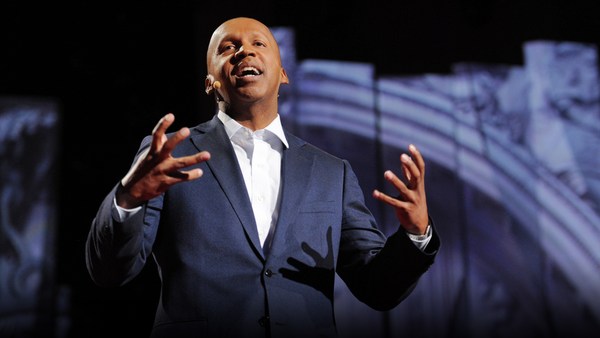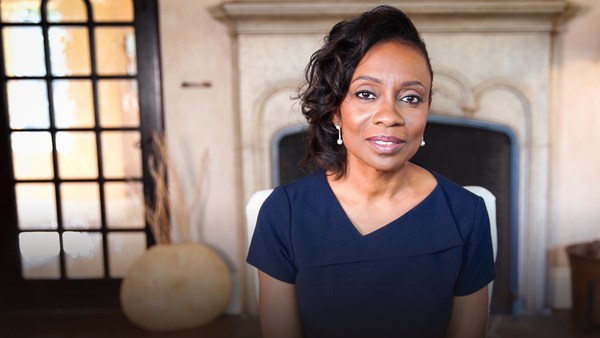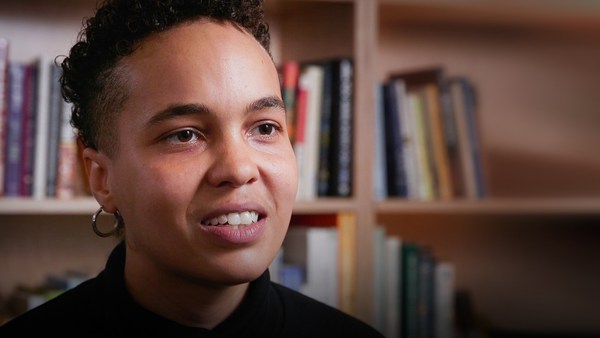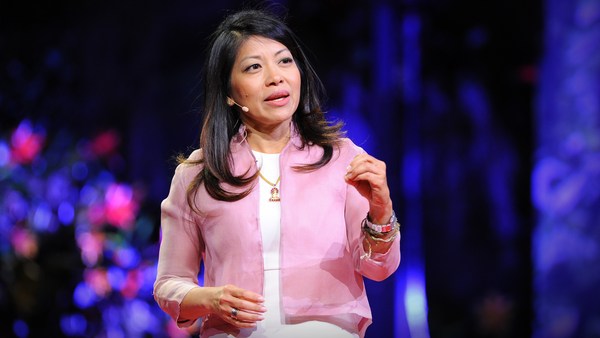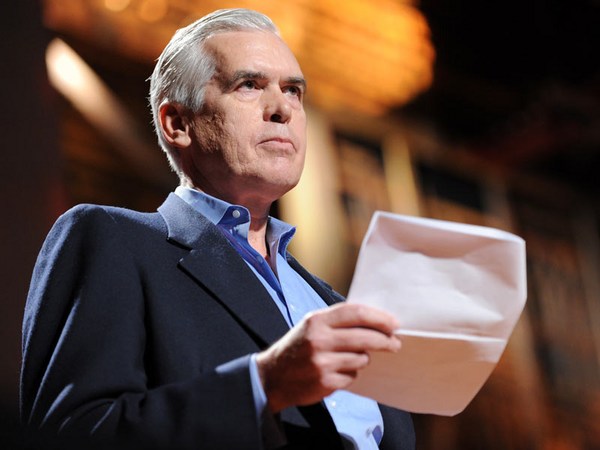(Music)
(Voice-over) John Lewis: My friends, let us not forget that we are involved in a serious social revolution. We want our freedom, and we want it now.
(Voice-over) JL: When you see something that is not right or fair or just, you have to say something, you have to do something.
(Voice-over) JL: It doesn't matter whether you're Black or white, we're one people and one family.
(Cheers)
(Voice-over) JL: One person with a dream, with a vision, can change things.
Bryan Stevenson: When people talk about you, what do you want them to say?
[TED Legacy Project]
[Congressman John Lewis In conversation with Bryan Stevenson]
BS: Well, this is such a great honor for me to be in this room with you, to have this conversation. I can't tell you what it means to me to have this opportunity. You represent something so precious to so many of us, and I just wanted to start by thanking you for that, for your willingness to wrap your arms around people like me and to make me think that it's possible to do difficult things, important things. And I just want to start by asking you to talk a little bit about that experience of growing up in rural Alabama in the Black Belt of America and how that cultivated this spirit that shaped your life and your vision. I mean, you used to have to pick cotton on your family's farm.
JL: When I used to fuss as a young child, I would complain, "Why this? Why that?" And my mother would say, "Boy, it's the only thing we can do." She said, "I know it's hard work, but what are we going to do? We have to make a living." But I was hoping and almost praying for that day when people wouldn't have to work so hard in the hot sun. She was hoping also that things would be better, much better for us as a people and for my family. My mother, she was always thinking ahead. If we'd get up early and go and pick as much cotton as we could, we would get more money, because she knew the cotton would be heavier 'cause the dew would be on it. So when it was weighed, money would be increased.
BS: Your mother sounds really strategic.
JL: My dear mother, one day, she came across a little newspaper in downtown Troy that said something about a school in Nashville, Tennessee, that Black students could attend.
BS: She encouraged you to apply for that, even though that meant you'd be leaving the house, you'd be leaving the farm, you would not be contributing that extra labor.
JL: Well, I was prepared and willing to go to try to do what my folks called "doing better," to get an education. But in the beginning, I wanted to attend Troy State.
BS: You wanted to desegregate Troy State.
JL: I submitted my application, my high school transcript. I never heard a word from the school. So I wrote a letter to Dr. King. I didn't tell my mother, my father, any of my sisters or brothers, any of my teachers. I told him I needed his help. He wrote me back and sent me a round trip Greyhound bus ticket and invited me to come to Montgomery to meet with him. And I can never, ever forget it.
BS: You knew about Dr. King even before the boycott. You had heard his sermon the Apostle "[Paul's Letter] to American Christians." It's the speech he gives to all the people in Montgomery four days after Rosa Parks has been arrested. At the end of the speech, he says, one day, they're going to tell a story about a group of people in Montgomery, Alabama. And then he says, of Black people who stood up for their rights, and when they stood up for their rights, the whole world changed. And you had an immediate response to that call to action.
JL: That message really appealed to me.
BS: Yeah.
JL: It was sort of a social gospel message.
BS: Yeah.
JL: I wanted to do what I could to make things better, 'cause when you see something that is not right or fair or just, you have to say something. You have to do something. It's like a fire burning up in your bones, and you cannot be silenced.
BS: That's right.
JL: My mother would have said to me, "Boy, don't get in trouble. Don't get in trouble. You can get hurt, you can get killed." Dr. King and Rosa Parks and E.D. Nixon and others that I read about at that time and later met, inspired me to get in what I call "good trouble," necessary trouble. And I've been getting in trouble ever since -- the sit-ins, the Freedom Ride ...
BS: You went to Nashville and began the work of learning nonviolence. When did nonviolence become an essential part of your worldview and the theology and the activism that you wanted to create?
JL: Growing up, I wanted to be a minister. I felt that what Dr. King was saying in his speeches was in keeping with the teaching of Jesus. So I readily accepted this idea --
BS: Yeah. Yeah.
JL: ... of nonviolence, the philosophy and the discipline of nonviolence. We were taught to respect the dignity and the worth of every human being and never give up on anyone; to try to reach them with kindness, with hope and faith and love. So you may beat me, you may arrest me and throw me in jail, but I'm not going to engage in violence. I'm going to respect you as a human being.
BS: And I'm wondering whether that is what gave you the courage to endure some of that brutality. Because a lot of people talk about nonviolence. They talk about the theology of love. But when you're on a bus in Anniston, Alabama, or in Montgomery, Alabama, as you've been, surrounded by that mob and surrounded by that hate, surrounded by people who you know are prepared to do violent things, it's a different dynamic.
JL: Yeah. I accepted that. Dr. King taught us to love. It's in keeping with my Christian faith to love everybody and never hate, because the hate was too heavy a burden to bear.
BS: But it seems like you were strategic, too. You all thought a lot about when and where to go someplace. It wasn't just, "Oh, here's an opportunity here, let's just do it.
JL: We just didn't jump up one day and decide that we would go to Selma. We checked places out. Wherever there was a possibility of leadership, of creating a viral organization, whether you had students, people who were prepared to get out and work and organize. And that's what we did. We did everything that we could to bring attention to a situation that was not good for people and then we could organize people. There were religious leaders teachers and lawyers and others in these communities and neighborhoods. There would come a time through the training and accepting nonviolence, the philosophy as a way of living, as a way of life, that you become prepared.
BS: It was a lot of rigorous training to be prepared to be in those very stressful situations and maintain that commitment to nonviolence, and I don't think people appreciate how much work went into preparing people for that.
JL: Well, it was something that we became committed to, a chance to go through role playing, social drama, pretending that you were beating someone or knocking someone down, someone's blowing smoke in your face and calling you all types of names, training people how to be disciplined and not giving up. On the Freedom Rides in May of 1961, when I was 21 years old, leaving Washington, DC, for the first time to go on the Freedom Ride -- I thought we were going to die. As a matter of fact, I thought I saw death, but I believe God Almighty kept me here for a reason.
BS: It's a powerful, powerful testimony, the picture of you, and your head is bloodied, this willingness to get back on a bus to do it again. And they interviewed you after some of the sit-ins, and what was interesting to me about the way you talked about it is you were very clear. You said, we're not just trying to do this for the Black people in Nashville. We're trying to do this for everybody, because they may not realize it yet, but what they're doing is wrong, and I wouldn't be the Christian that I claim to be, I wouldn't be the good person that I claimed to be, if I didn't try to help them get past this wrong thing they're doing. I think people want redemption. Our faith tradition, we understand the power of redemption. We preach about it, and we understand that there has to be confession, there has to be repentance. But collectively, as a society, we haven't really embraced that in this country. We haven't really wanted to acknowledge the legacy of slavery and the history of lynching and segregation. People want to skip over the apology part, and you still see these Confederate flags and these symbols of resistance. It seems to me part of what is so urgent right now is that we get people to have the courage to say, "You know, this was wrong, and we have to reject that." But you have seen that redemption in ways that I think has been so extraordinary.
JL: A few short years ago, one of the members of the Klan who beat me and beat my seatmate, in a little town called Rock Hill, South Carolina, left us lying in a pool of blood ... Many years later, one member of the Klan and his son came to my office in Washington, and he said, "I've been a member of the Klan. I'm one of the people that beat you and left you bloody. I want to apologize." His son started crying, then he started crying. He came up with his son to hug me. I hugged them back, and I saw this gentleman three other times. It's the power of the way of love, of forgiveness, to admit it and say, "I'm changed," and move on.
BS: It does seem to me that if we can show people that on the other side of repentance, on the other side of confession, on the other side of acknowledgment, there's something beautiful, like what you experienced with that Klan member, then maybe they'll find their courage to stand up and talk about the wrongfulness of these things. And I've been curious how you would talk about what you learned from your time with Rosa Parks and Dr. King, what they taught you, what they left you with that has allowed you to do the work you've done.
JL: There's something about these individuals, they touch me, they reach me. If it hadn't been for E.D. Nixon or Rosa Parks, Martin Luther King, Jr, Reverend Ralph Abernathy and so many others, I don't know what would have happened to me. I could have been lost. But for Martin Luther King, Jr, to ... sent me a round trip Greyhound bus ticket and invited me to come to Montgomery to meet with him, my first Baptist church -- it's impossible, impossible for a poor, barefooted boy to dream that one day, he would meet Martin Luther King, Jr. I remember so well when he said, "Are you the boy from Troy? Are you John Lewis?" And I said, "Dr. King, I am John Robert Lewis." And he called me "the boy from Troy." "How is the boy from Troy doing?" And sometimes, he would say things like, "John, do you still preach?" And I would say, "Yes, Dr. King, when I'm taking a shower so no one can hear me."
BS: (Laughs)
JL: And he would laugh. I think when he was assassinated, when he died, something died in all of us. If he had lived -- he was a very young man -- maybe our country would be much better and the world community would be better off.
BS: We were talking earlier about those critical moments, 1964, the passage of the Civil Rights Act, the Voting Rights Act in 1965, and it seems like our focus was on ending the violations of rights and less on remedying this long history of violations and what it would take to repair all the damage that has been done. And today I'm thinking, in addition to no longer denying Black people the right to vote, maybe these states should have done something reparational, should have done something remedial. They should have said, "You know what, we're going to automatically register every Black person to vote."
JL: The vote is the most powerful nonviolent instrument or tool that we have in a democratic society, and we must make it easy and simple for people to use it. The people who gave their very lives --
BS: Yes.
JL: ... people who took the beatings and suffered so we have a right to know what is in the food that we eat --
BS: Yes.
JL: ... what is in the water we drink or the air we breathe.
BS: You were the youngest speaker at the March on Washington in 1963, and you were very eloquent and you were very compelling.
JL: I had worked on the speech with some of the staffers of the Student Nonviolent Coordinating Committee, but I was determined to inspire young people, another generation. And when I looked out and saw that sea of humanity, I said to myself, "This is it. I must go forward." I tell you, it came together and we worked, all of us, very hard on getting the Lord's cry out on the Mall that day. But it went so well, the president, President Kennedy, invited us down to the White House after the march was over, and he stood in the door of the Oval Office greeting us and beaming like a proud father, and he kept saying to each one of us, "You did a good job. You did a good job." And when he got to Dr. King, he said, "You did a good job, and you had a dream." That was my last time seeing President Kennedy.
BS: Wow.
JL: I admired him.
BS: Yeah.
JL: There was something about the man that was so inspiring.
BS: Yeah. Yeah. You talked about how he and Robert Kennedy were an influence to get into politics. I know you first ran in the '70s, and then you ran again in the '80s. I'm curious -- what motivated you to make that shift?
JL: I saw in politics that you could be a force for good. So I was motivated to run for office, and people started encouraging me, "You should run for something." And I made a decision. I don't think I changed that much. I think I'm the same sane person.
BS: (Laughs) I said what I want to say and, for the most part, I do what I want to do. I think you have to be a force for good --
BS: Yeah. Yeah.
JL: ... to inspire people, to encourage people.
BS: I was so moved when you organized the protests around gun violence, and I'm wondering how you think we should be teaching people what it means to be hopeful. How do you think about communicating that to both your colleagues in the Congress and another generation of leaders?
JL: You may get down, you may get knocked down, but you get up. You keep moving, you keep pressing on. That was part of the civil rights movement, a new day, a better day was gonna come, but we had to help that day come. We couldn't be quiet, couldn't be silent. We have to be engaged in creating a way out of no way.
BS: Do you think there are strategies that we've abandoned that we need to pick back up to confront the issues that we're looking at today?
JL: I think there's so many tactics and techniques that we've sort of abandoned that we need to go back and pick up these techniques and tactics and use them. We need to teach people, especially our young people. We talk to grade school students and high school students and college students to learn to embrace the philosophy and the discipline of nonviolence, how to engage in nonviolent direct action. We need it now more than ever before.
BS: I think you've brought into our political culture this spirit of activism, this spirit of strategic protest, a willingness to even occasionally be disruptive. You haven't attended all of the inaugurations of presidents when you've felt like there were issues around the legitimacy of those elections, and I see a new generation of politicians that seem to embrace some aspects of that, and I'm wondering whether you think that the kind of modeling you've done is going to be part of your legacy that's important to you as a politician.
JL: I've been so impressed with this new breed of young men and young women that are coming into elected positions. It's not just at the national level but also at the local level. And I think we, now more than ever before, need men and women of conscience as judges, especially on the federal level, but also at the state and local level, to say, "We've got to mend. We've got to make up."
BS: Yeah.
JL: And people don't have 100 years to make up. We need to do it and do it now.
BS: You've become somebody who has had such an impact on the world. When people talk about you 50 years from now, 100 years from now, what do you want them to say? How you want to be thought of, how you want to be talked about?
JL: My hope -- I don't think I would have much to say about it, but it would be: he tried to create a better society, a better world, helping to liberate and free people, helping to save people and move people to a different and better sense of humanity.
BS: I have met people who worked with you. There are so many whose names have never really been known, but I encounter them every now and then, because I get to live in Alabama. And I talk about a man I met who was in a church. I was giving a talk, and he was in the back. He was in a wheelchair, and he was staring at me the whole time I was giving this talk, and he had this stern, almost angry look on his face. And when I finished my talk, people came up. They were very nice and appropriate, but that older Black man in a wheelchair just kept staring. And then he finally wheels himself to the front, and when he came up to me, he said, "Do you know what you were doing?" And I just stood there. And then he asked me again, "Do you know what you're doing?" And I mumbled something. I don't even remember what I said. And he asked me one last time, "Do you know what you're doing? Because I'm going to tell you what you're doing." He said, "You're beating the drum for justice. You keep beating the drum for justice." And I was so moved. I was also relieved, because I just didn't know what was about to happen. But then he said, "Come here, come here, come here." And he pulled me by my jacket, and he pulled me down close to him, and he turned his head, and he said, "You see this scar I have right here behind my right ear? I got that scar in Greene County, Alabama, in 1963, working with C.T. Vivian."
JL: Yeah, Greene County.
BS: Then he turned his head. He said, "You see this cut down here? I got that in Philadelphia, Mississippi trying to register people to vote." And then he said, "You see this bruise? That's my dog spot. I got that in Birmingham, Alabama, in 1965 during the Children's Crusade." And then he said, "People look at me, they think I'm some old man covered with cuts and bruises and scars, but I'm going to tell you something. These are not my cuts. These are not my bruises. These are not my scars." He said, "These are my medals of honor." And I am sitting here sitting next to you, and I still see the scars, and I know that there are the bruises, and I know that there are the cuts, and yet you are still talking about love and redemption and justice and inspiring people like me. And I just want you to know, I don't think there's an American living that is more honored, more representative of the great values of this nation, of the hope of this nation, than you, and I just cannot tell you how thrilled and privileged I am to have this opportunity and to have this opportunity to share, and I want you to know I am going to keep fighting. A lot of us are going to keep fighting, and you have caused us to believe that we cannot rest until justice comes. And I want you to thank you for that.
JL: Wish you well.
BS: Absolutely, my friend. Absolutely. Bless you.
JL: OK. Bless you, brother.
BS: Thank you. Thank you.
[Congressman John Lewis February 21, 1940 - July 17, 2020]
[Rest in Peace]
